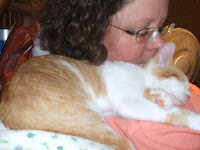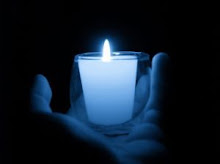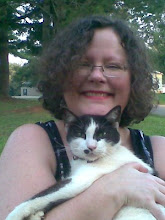My supervisor told me yesterday that my paper for her Research Literacy class will be published shortly. She had to edit it to fit the journal. I asked permission, and received it, to publish the unedited copy here to my blog. My love to trans friends!
Many researchers have acknowledge the shortage of training in graduate programs for gender variant and transgender clients (Laird & Green, 1995; Long, 1996; Long & Bonomo, 2004; Long & Serovich, 2003; Ritter & Terndrup, 2002). Indeed, only fifty percent of marriage and family therapists report feeling competent to treat lesbians and gay men (Doherty & Simmons, 1996). It is unknown as to how many feel competent with gender variant clients. While public conversation has begun to accept the topic of gender variant people, society still treats this population as strange, exotic or alien (Laird, 2004; Lev, 2004).
Even among the professionals, before the DSM-IV, the medical field pathologized gender disorders as perversion, immature development stage or psychotic (Israel, 1997). These attitudes have placed gender variant people at risk emotionally and physically, including male victims of sexual violence (Cooks-Daniels, 2006). Moreover, clinicians report an increase in the number of individuals who describe themselves as transgendered that present for therapy (Feldman & Bockting, 2003, Lev 2004). As a result of these needs, Marriage and Family Therapists increasingly must familiarize themselves with the challenges faced by gendered variant people and their communities. In fact, marriage and family therapy is uniquely situated to meet this population’s needs, as gender variance does not occur in isolation, but in conjunction with other relationships, consequently affecting spouses, parents, children and community (Buxton, 2006; Lev, 2004).
In this post-modern era, the body has become a battlefield because of society’s determinism to define bodies as sexed either male or female (Costello, 1994; Cream, 1994). Gender variance includes persons who experience discomfort with their physical body and experience the desire to express the gender attributes of the opposite sex. In addition, for the gender variant person, the spaces where sexual orientation meets their gender identity can become quite complicated (Devor, 2002; Devor, 1993).
Early research in gender variance suggested that a greater number of men than women presented with gender dysphoria, possibly as high as 8:1 (Blanchard, Clemmenson, & Steiner, 1987). More recent research, however, suggests that that ratio is 1:1 and that women do not necessarily present for surgery at gender clinics, preferring to simply blend into society as “tomboys (Bower, 2001; Devor, 1997). Certainly not all transgendered people opt for full surgery. For example, “tranny boys” are lesbians who choose mastectomy but not hormonal or surgical intervention (Deogracias, Johnson, Meyer-Bahlburg, Kessler, Schober & Zucker, 2007; Lev, 2004; Devor, 1997).
Gender becomes a way to organize past and future cultural norms, allowing one to situate identity in respect to societal norms and live an active lifestyle based on the body one occupies (Webster 2002; Cream, 1994; Butler 1986). Finding a space in which to explore one’s gender can become very political; for example, some feminists protest that some gender expressions limit other possible gender meanings. Unfortunately, this stance can run counter to the feminist stance on marginalization and their attempts to give voice to those who have become disenfranchised (Heyes, 2003).
Attempting to create spaces in which to discuss gay, lesbian, bisexual and transgender issues led to the development of queer theory. Specifically, as gender variant people do not meet cultural binary expectations, according to queer theory, their identities constantly form and reform, thereby challenging heteronormative assumptions (Abes, 2007; Heyes, 2003; Johnson, 2003; Butler, 1986). As gender comes to be entirely socially constructed (Devor, 1993), this in turn becomes a challenge to heteronormative societal power structures (Longhurst, 1997; Foucault, 1978).
Rather than sex being equivalent to gender; sex becomes a physical characteristic and gender determined by a role played in society (Devor, 1993; Devor 1997; Butler, 1990). Gender then becomes not just a cultural construct, but also a performitive act in which one constructs self identity (Butler, 1986; Devor, 1993). Unfortunately, for all of these gender variant people, stepping outside of one’s assigned gender places one’s very existence into question because bending gender boundaries creates profound dislocation (Butler, 1986; Costello, 2006; Lev, 2004).
The act of recognizing oneself as transgendered can become a process carried over many years (Devor, 2004). At times, the incongruities between gender and sex can pose a danger to safety, for example, in public restrooms (Devor, 1987, Fausto-Sterling, 2000; Lev, 2004). When dissonance between self and culture heighten, gender variant people present in therapy with symptoms of excessive pain, agitation, guilt, restlessness and malaise (Lev, 2004; Schaefer & Wheeler, 2004). In addition, as gender variant teenagers move into adolescence, they report loneliness, depression and suicidal ideation (Devor, 1997; Costello, 2006). Furthermore, society silences the voice of gender variant children, assuming that they do not know enough about gender and sexuality to establish their identity (Costello, 2006).
To assist the gender variant community, therapists must change their image of gatekeepers and diagnosticians that judge, label, and possibly withhold surgical assistance to transgender and gender variant people (Behan, 2006; Devor, Lev, xxv). We must be aware of the shortcomings of the DSM-IV, which leaves out a number of diagnostically significant features (Bowers, 2001). For example, impairment of social function, a specifier in the diagnosis, is not present in every case.
Moreover, not every gender variant person needs or wants hormonal or surgical alterations (Fausto-Sterling, 2000; Lev, 2004). Recently published, the gender identity/gender dysphoria questionnaire for adolescents and adults (GIDYQ-AA) has been designed to aid clinicians in discerning an entire spectrum of gender idendities (Deogracias, et al., 2007). However, diagnostic labeling of gender variance has become both controversial and political. As transgendered people increasingly demand their rights, the difficulties of our diagnostic categories become more pronounced (Devor, 2002; Lev, 2004; Fausto-Sterling, 2000).
Therapists must educate themselves on the coming out process for gender variant people. Because the experience of “coming out” interrupts binary patterns of Western thought, much of our society fails to recognize that the process is not a discussion of sexuality but is a discussion of identity (Allen 1995; Lev 2004). As therapists, we must be prepared to work with people with gender variance and their families. We must build upon the incredible resilience that such marginalization requires (Allen, 1995; Laird, 1993).
It can take three to six years for straight spouses to recover from the shock and to accept reality (Buxton, 2006). A spouse’s coming out will create struggles with sexuality, marriage, children, identity, integrity and belief systems (Buxton, 2006). Therapists should never underestimate the commitment required of gender variant people or the pain and suffering they must endure, as well as the danger, violence or hostility they risk (Cream, 1994). Moreover, to deny one’s identity renders the person socially invisible (Allen, 1995; Devor, 2002; Lev, 2004).
Consequently, the “coming out process” becomes vital in the role of mental health for gender variant people and their communities (Behan, 2006). For young gender variant people, the families are often plagued with feelings of having done something wrong, or feelings of helplessness (Behen, 2006), making the role of the family therapist critical.
Family therapy has been slow to recognize the influence of sexuality in therapy, and in addressing the issues of gender variance on the family. Gender variant families can often be problem saturated, with struggles like heterosexual families, and with problems that go beyond those norms. Internalized homophobia, both within the gender variant client, their families and community add powerful stressers. With adolescents disclosing to their families, parents disclosing to the children, various system family therapies may be used (Long, Bonomo, Andres, & Brown, 2006).
Each of the various approaches, whether it be Bowenian, Solution Focused, Structural or Experiential, for example, offer possibilities and cautions (Behan, 2006; Long, et al., 2006). Perhaps the strength of each therapy lies upon the strength and sensitivity of the therapist. But if therapists are ill prepared, it has been suggested, that may because their supervisors are ill prepared as well. To address this need, Janie Long and Josephine Bonomo have created a matrix geared at addressing heterosexual bias and the degree of acceptance of GLBTQ orientations and behavior in both supervisees and supervisors (2006).
Acknowledging the lack of training for therapists in their respective programs, Long and Bonomo seek to create an opportunity for inward reflection for the self as a therapist in regards to those clients who exist in the sexual minority. As therapists establish themselves as LGBTQ allies, they become not only allies within therapeutic encounters but also with the community, counteracting stereotypes and homophobia that creates so much harm in gender variant communities (Lynch &McMahon-Klosterman, 2007).
References
Abes, E., & Kasch, D. (2007). Using queer theory to explore lesbian college students' multiple dimensions of identity. Journal of College Student Development, 48 (6), 619-636.
Allen, K. (1995). Opening the classroom closet: Sexual orientation and self-disclosure. Family Relations, 44 (2), 136-141.
Behan, C. (2006). Talking abut gender in motion: Working with the family of the transgendered person. Journal of GLBT Family Studies, 2 (3/4), 167-182.
Blanchard, R., Clemmenses, L., & Steiner, B. (1987). Heterosexual and homosexual gender dysphoria. Archives of Sexual Behavior, 16 (2), 139-152.
Bower, H. (2001). The gender identity disorder in the DSM-IV classification: A critical evaluation. Australian and New Zealand Journal of Psychiatry, 35 (1), 1-8.
Butler, J. (1986). Sex and gender in Simone de Beauvoir's Second Sex: Witness to a century. Yale French Studies, 35-49.
Buxton, A. (2006). When a Spouse Comes Out: Impact on the Heterosexual Partner. Sexual Addiction & Compulsivity: The Journal of Treatment & Prevention, 13 (2), 317 –332.
Cameron, P. (2006). Children of homosexuals and transsexuals more apt to be homosexual. Journal of Biosocial Science, 38 (3), 413-418.
Cook-Daniels, L. (2006, Oct 17). Publications & Resources. Retrieved June 15, 2008, from Trans Sexual Violence Project: www.forge-forward.org/transviolence
Costello, L., & Duncan, D. (2006). The 'evidence' of sex, the 'truth' of gender: Shaping children's bodies. Children's Geographics, 4 (2), 157-172.
Cream, J. (1994). Re-solving riddles: The sexed body. In D. Bell, & G. Valentine, Mapping Desire: Geographics of Sexualities (pp. 31-40). New York: Routledge.
Deogracias, J., Johnson, L., Meyer-Bahlburg, H., Kressler, S., Schober, J., & Zuker, K. (2007). The gender identity/gender dysphoria questionnaire for adolescents and adults. Journal of Sex Research, 44 (4), 370-379.
Devor, A. (2004). Witnessing and mirroring: A fourteen stage model of transsexual identity. Journal of Gay & Lesbian Studies, 8 (1/2), 41-67.
Devor, H. (1997). Female gender dysphoria in context: Social problem or personal problem. Annual Review of Sex Research, 7, 44-89.
Devor, H. (1993). Sexual orientation identities, attractions, and practices of female-to-male transsexuals. The Journal of Sex Research, 30 (4), 303-315.
Devor, H. (2002). Who are "we"? Where sexual orientation meets gender identity. Journal of Gay & Lesbian Psychotherapy, 6 (2), 5-21.
Faucoult, M. (1978). The history of sexuality: An introduction (vol 1). New York: Pantheon Books.
Fausto-Sterling, A. (2000). Sexing the Body: Gender Politics and the Construction of Sexuality. New York: Basic Books.
Feldman, J., & Bockting, W. (2003). Transgender health. Minnesota, 7, 25-52.
Heyes, C. (2003). Feminist Solidarity after queer theory: The case of transgender. Signs: Journal of Women in Culture and Society, 28 (4), 1093-1120.
Israel, G., & Tarver, D. (1997). Mental Health. In G. Israel, & D. Tarver, Transgender care: Recommended guidelines, practical information, and personal accounts (pp. 21-55). Philadelphia: Temple University Press.
Laird, J. (2004). Forward. In A. Lev, Transgender emergence: Therapeutic guidelines for working with gender-variant people (pp. xi-xvii). Binghamton, NY: Hawthorne Press.
Laird, J., & Green, R. (1995). Guest editors' "Introduction" to special issues "Lesbian and gays in families" The last invisible minority". Journal of Feminist Family Therapy, 7, 3-13.
Lev, A. (2004). Transgender emergence: Therapeutic guidelines for working with gender-variant people. Binghamton, NY: Hawthorne Press.
Long, J. (1996). Working with lesbians, gays, and bisexuals: Addressing heterosexism in supervision. Family Process, 35 (3), 1-6.
Long, J., & Bonomo, J. (2006). Revisiting the sexual orientation matrix for supervision: Working with GLBTQ families. Journal of GLBT Studies, 2 (3/4), 151-166.
Long, J., & Serovich, J. (2003). Incorporating sexual orientation into MFT training programs: Infusion and exclusion. Journal of Marital and Family Therapy, 29 (1), 59-68.
Long, J., Bonomo, J., Barbara, A., & Brown, J. (2006). Systemic therapeutic approaches with sexual minorities and their families. Journal of GLBT Family Studies, 2 (3/4), 7-37.
Longhurst, R. (1997). (Dis)embodied geographies. Progress in Human Geography, 21 (4), 486-501.
Lynch, J., & McMahon-Klosterman, K. Guiding the acquisition of therapist ally identity: Research on the GLBT stepfamily as resource. Journal of GLBT Family Studies, 2 (3/4), 123-150.
Ritter, K., & Terndrup, A. (2002). Handbook of affirmative psychotherapy with lesbians and gay men. New York: The Guilford Press.
Schaefer, L., & Wheeler, C. (2004). Guilt in cross ender identity conditions: Presentations and treatment. Journal of Gay and Lesbian Psychotherapy, 8 (1/2), 117-127.
Sullivan, N. (2003). A critical introduction to queer theory. New York: New York University Press.
Webster, F. (2002). Do bodies matter? Sex, gender and politics. Australian Feminist Studies, 1738, 191-205.


















































